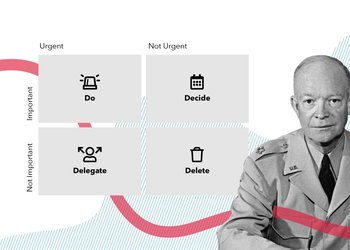Cookie Policy
Time Management Skills - 5 skills that the most productive people master


Exceptional time management starts with the right set of skills. No time management app, technique or even a simple tip can help you manage your time better if you don’t develop a few core time management skills.
In this article, you will learn which skills are the cornerstone of the most productive people in the world, and how you can develop them.
At this point, you might be asking yourself: why are time management skills so important? Well, a skill is nothing other than the ability to perform something well.
Without proper time management skills, you simply lack the capacity to organize your time (even less as a manager), yourself in general or others in a smart and consistent way.
Even if you find the perfect time management technique or tool, you don’t have the internal resources necessary for preserving things in practice.
Without the right time management skillset, you don’t have what it takes to follow through with the selected time management techniques or tips.
- Don’t confuse time management skills with time management techniques or even personality traits
- Skills are closely interlaced with techniques
- Core time management skills and how to develop them
- 1. Planning
- 2. Decision making and prioritization
- 3. Setting boundaries and saying no
- 4. Delegating and outsourcing tasks
- 5. Building a system and diligently following it
- The full list of time management skills
Don’t confuse time management skills with time management techniques or even personality traits
It’s very important that you don’t confuse time management skills (or any other set of skills) with time management techniques or even personality traits.
Personality traits are features of your character. They are an integral part of your personality, shaped by your genes and (early) life experiences. They are very hard to change; almost impossible in the short or mid-term.
Very popular models of personality traits are, for example, Big Five personality traits and The HEXACO Personality Inventory.
The HEXACO measures the following personality traits:
- Honesty-Humility: Sincerity, Fairness, Greed-Avoidance, Modesty
- Emotionality: Fearfulness, Anxiety, Dependence, Sentimentality
- Extraversion: Social Self-Esteem, Social Boldness, Sociability, Liveliness
- Agreeableness: Forgivingness, Gentleness, Flexibility, Patience
- Conscientiousness: Organization, Diligence, Perfectionism, Prudence
- Openness to Experience: Aesthetic Appreciation, Inquisitiveness, Creativity, Unconventionality, Altruism
There are, of course, some personality traits that help with being good at time management.
Even more, people with some types of personalities can acquire new skills much faster, including time management skills. Conscientiousness is especially important in this regard.
Nevertheless, with so many different time management techniques, you can definitely find the right time management solution for your personality. Thus, knowing your personality should be the first step towards better time management.
How to create a
PRODUCTIVE & ORGANIZED
working place, where people
love to perform


Personality traits are hard to change. To be good at time management, you should find the set of techniques that fits your personality best and to develop those core time management skills that empower your personality advantages and neutralize the disadvantages.
Luckily, skills are much easier to learn than a personality can be changed. You can acquire new skills through life experience or, even better, with training. Simply said, if you practice one thing for long enough (for example, correctly prioritizing your tasks), you become good at it sooner or later.
We know three main types of skills:
- Hard skills and labor skills, which are also known as technical skills or skills related to a specific craft or technique. They are usually very little related to one’s personality.
- Soft skills, which are closely related to personality traits and consist of people skills, social skills and communication skills. Soft skills are very important in time management.
- Life skills, which are abilities for effectively dealing with life challenges. Among life skills, the most important are: decision making, problem solving, creative thinking, self-awareness, empathy, assertiveness, equanimity, resilience, coping with stress and emotions. Soft skills are in a way a subcategory of life skills.
Skills are closely interlaced with techniques
Even if skills, techniques and personality traits are not the same, they are closely interlaced, supporting each other.
For example, if we take a very popular skill such as swimming, the breaststroke is a swimming technique. Then in effective communication, mirroring is a popular technique.
A proper technique can guide you through acquiring a new skill or shows how to put a certain skill to practice in the best possible way. A proper technique or best practice recommends the right set of procedures and methods to follow and which tools to use.
In summary, here is the difference between all the definitions mentioned above:
- A skill is an ability to do something (swimming).
- A technique is an efficient way to put a skill in practice, a best practice (breaststroke, butterfly stroke etc.).
- Different techniques usually empower a different set of methods and tools that help you learn a new skill, apply it in practice more easily or perform it better (when swimming: how to do arm action, kicking, breathing, turning, using different swimming tools etc.).
- Personality traits are an integral part of one’s character, usually very hard to change.
And if we apply that to time management:
- Time management skills: boundary setting, planning, delegating etc.
- Time management techniques: getting things done, Pomodoro timer, Eisenhower matrix etc.
- Time management tools: calendar, note-taking software, time tracker (e.g. My Hours)
- Personality traits that encourage good time management: social boldness, flexibility, organization, diligence and prudence
Core time management skills and how to develop them
Now that we know the important difference between time management skills, techniques, tools and personality traits, let’s analyze the core time management skills and how to acquire them. The five most important time management skills are:
- Planning
- Decision making and prioritization
- Setting boundaries and saying no
- Delegating and outsourcing tasks
- Building a system and diligently following it
How to create a
PRODUCTIVE & ORGANIZED
working place, where people
love to perform


1. Planning
Good time management starts with good planning skills. It’s very hard to manage your day or week if you don’t have a good plan of which tasks should get completed. Developing proper planning skills is the first step toward better time management. Of course, in practice, a day never goes completely according to plan, but a good plan is the tool to help you calibrate the course of the day and not stray off course.
"Plans are worthless, but planning is everything." - Dwight D. Eisenhower
Planning skills are important in many aspects of time management. Preparing task lists, building sequences of work, calendar management, making meeting agendas, even preparing project plans, it all involves proper planning skills.
With proper planning skills, you must be able to imagine what needs to be done and prioritize the most important tasks. Then you also have to execute the plan with proper self-monitoring and evaluate how good is the plan you’ve created.
How can you develop planning skills? The best way to develop planning skills is to consistently use a calendar tool, such as Google calendar. Simply plan your week ahead, directly in the calendar: When to wake up. Which task to start first in a day. When to take meetings. Your leisure time. And so on.
Write everything directly into the calendar. That will give you a good overview of how you will spend time in the following week. It’s the simplest type of plan you can make. When you master your calendar, you can start using more advanced plans. Studying best practices in project planning is definitely a good next step.
2. Decision making and prioritization
The point of a plan is not only to imagine how things should go but also to decide about the priorities. The idea is to make hard decisions about how you should spend your precious time.
We all have the same number of hours in a day. What we do with those hours is what makes the real difference in time management. The bottom line is that good time management skills mean making good decisions about your time.
There are many decisions to make when it comes to time management. How long you will sleep, where you will work, which tasks you will start first, how long you will work and so on.
Since most people hate decision making, they usually just go with the flow and let their bosses, spouses, and others determine how they will spend time. But that usually leads to poor time management, so don’t be one of those people.
If you want to be good at time management, you must be in control of your time. If you want to be in control, you have to pull the strings wherever possible.
You have to prioritize, you have to decide which tasks to tackle first, and which tasks you will say no to (to the extent possible in your current position).
How can you develop good decision making and prioritization skills? The Eisenhower matrix is probably the best start for learning prioritization. The matrix recommends arranging tasks in one of the four quadrants:
- Urgent + Important (Do)
- Urgent + Not Important(Delegate)
- Not Urgent + Important (Put it in your calendar)
- Not Important + Not Urgent(Delete)
List all the tasks you have to perform in a week. Arrange them in one of the four quadrants. In every quadrant, sort them from the most important one to the least important one. Start with the most important and urgent tasks. That’s how you’ll practice making decisions about your time.
3. Setting boundaries and saying no
If you want to be good at time management, you have to treat your time as the most precious resource you possess.
That means setting very clear boundaries to people who want to delegate tasks to you or to engage you in projects and activities that are not your priority. In this regard, saying no is one of the most important skills in time management.
Just like you must learn to say no to other people, you also have to learn how to set boundaries for yourself. If you don’t know how to do that, you could take too much work on your plate and not deliver.
Or you can do too many things at once. Limiting work in progress, avoiding multitasking, and limiting the number of active projects are all important tips in time management.
How can you learn to say no? If you lack social boldness and assertiveness, you might have a hard time saying no to people.
The best way to develop good boundary-setting skills is to start saying no in small unimportant situations, and then slowly scale up to the bigger things where you are more emotionally involved. Practice makes perfect. Practice gets you out of your comfort zone.
It also makes sense to ask yourself what you are afraid of in rejecting others (usually it’s because you think that people will have a bad opinion about you after a rejection or that they will reject you the next time you try to engage them etc.). When you have the reasons, explore if they are really viable.
You can also help yourself with some templates for e-mails with respectful declines of collaboration or you can prepare a few good rejections or excuses in advance.
But the best advice is to just be honest – I would love to, but I don’t have the time, so I’ll pass on the opportunity. Thank you, I really appreciate it.
4. Delegating and outsourcing tasks
Saying “no” is about protecting your time. Delegating tasks is about leveraging other’s people time. Learning how to delegate is a very important next step in being a master of time management.
The main point of task delegation is that you can focus on the highest value activities and get all the rest off your back. It’s a kind of specialization.
With proper delegation, you can also engage people who are bigger experts than you are at some things, meaning they can perform some tasks better and faster.
Delegating tasks might sound simple, but it’s really not. First, you have to find the right people whom you can trust and who will actually deliver. Then you have to build a relationship with them and properly communicate “the definition of work done” and “acceptance criteria” when you delegate.
People rarely deliver as expected the first time. That means you need to learn to give constructive feedback.
You need to know how and when to use the carrot and the stick for their work to improve. The good news is that learning how to delegate or outsource tasks greatly contributes to your leadership skills and personal development.
How can you learn to delegate? If you have never been in a leadership position or never really delegated, prepare a list of all the tasks you could delegate.
These tasks can be business (administration, legal, social media management etc.) or personal in nature (cleaning, washing, grocery buying etc.).
Assess every task according to how easy or hard it is to delegate it. Follow criteria such as: task complexity, potential executants, price, time sensitivity etc. Then start with the easiest task to delegate.
Invest some energy and find the right person for the job. Expect there will probably be some issues with performance, communication or relationships at the beginning. But that’s the only way to really learn to delegate and really leverage other people’s time.
5. Building a system and diligently following it
When you learn how to plan, prioritize, delegate and so on, it sooner or later wakes up the need for a coherent and complete time management system. There are numerous time management techniques that can be employed. At least 50 of them.
Only a few are really complete (for example GTD is one of those, but in practice, people more often compose their own system from a few techniques that suit their personality most. With more than 50 time management techniques available, the selection is huge.
In this regard, you actually need two skills. The first one is building a system for yourself and constantly improving it.
That consists of experimenting with different techniques, exploring what suits your personality best, and then putting the selected techniques together in a meaningful way. It usually takes a few months to build a system that really works.
The second skill is diligently following the system. There’s no value in a personal time management system that’s not being used regularly.
How can you build the best time management system for yourself and then actually use it?
First, research all the time management techniques out there. Select the ones you find the most interesting. Start testing them one by one in practice and give yourself a few months to select the techniques that fit you best.
Absolutely combine time management techniques with different tools that support the selected techniques; that can be different calendars, note-taking, time management apps and other apps in combination with reminders, notifications and checklists.
Using a good time tracker is an important part of a complete time management system. You can try our time‑tracking app for free for the first 30 days.
How to create a
PRODUCTIVE & ORGANIZED
working place, where people
love to perform


The full list of time management skills
There are many other important skills when it comes to time management. We have put together a more comprehensive list of time management skills, so you can make a self-assessment of which skills you need to still develop to become really good at time management.
Asking for help – Sometimes when you get stuck, overwhelmed or there’s no way to outsource, your only option might be to ask for help. Some people find asking for help humiliating,and see it as a sign of not being good enough. But there’s nothing really wrong with asking for help. Actually, it’s more of a sign of strength than weakness.
Automating tasks – Wit hall the technology, there are many options for task automation, especially when it comes to email and social media management. Explore services like IFTTT and Zapier for more information on how to automate tasks.
Batching – There are many things you can batch together to become more productive. Types of tasks, meeting locations, telephone calls (you may use call handling services) etc. Batching can be a good antidote to multitasking and a great way to improve your productivity.
Clarity – Being confused or lost is a big enemy of progress and using your time productively. It means you are stuck and not moving forward. Having a very clear perspective of what you want and how you will get there is the core enabler of good time management.
Completion – Many people have difficulties actually completing a task. They complete a task to 90 % or even more, and then they have an emotional block preventing them from crossing the finish line. You definitely need to know how to get past such a burden.
Coping skills / Stress management – In a complex and stressful environment, you need to stay focused, sharp and immune to many outside distractions. To avoid feeling overwhelmed, you need to develop good coping skills. That includes capabilities such as overcoming stress and dealing with difficult people.
Creating routines – Our brains love routines and patterns. We see patterns even where there are none. But the good news is that when you get used to a routine, it takes almost no effort to follow it. Consequently, routines are a very important part of the time management. Your time management system should consist of a set of routines. For example, every morning you can write down the three most important tasks for the day. It’s a simple routine that can skyrocket your productivity. As an interesting fact: it usually takes 1 to 2 months to get used to a new routine.
Discipline / Beating procrastination – Discipline means that you do something whether you like it or not. It takes discipline to start a task, it takes discipline to follow through with the task, and it takes discipline to finish it. It also takes discipline to beat procrastination and to get things done.
Staying flexible – In reality, things never go according to plan. That means you have to stay flexible to maximize your output in any given situation. As we said, planning is really important, but then you have to stay flexible about how your goals will be achieved.
Focusing / Avoiding multitasking – Multitasking is a big enemy of good time management. Of course, there are times when you have to juggle several things at once, but in general, good time management skills require the mental capabilities to focus on one thing and get it done.
Goal setting – The better you know the direction for where you want to be, the better you can outline your strategy and tasks that need to be performed to achieve the set goals. In other words, your most important tasks are always closely connected to your life and business goals. If you don’t have clear goals in your life, there’s almost no need for time management.
Getting in the flow – “Flow” is one of the most productive states you can be in. You forget about everything and just create and deliver. If you want to get into the flow, you have to work in peace on a challenging task, while being empowered by intrinsic motivation.
Organizing things, including lists and notes – An important part of time management is organizing yourself and your environment in a productive way. That includes having a clean desk, a system for filing, note-taking, making and following checklists, and so on.
Problem-solving – When you work on your tasks, problems always arise. Your job is not to dwell on these problems, but to tackle them and solve them in the most efficient way. Never waste time.
Punctuality – If you are not on time, you are late. How could you be good at time management, if you’re always late. Being late is often a clear sign that you don’t have control over your time. A messy desk can be such an indicator, for example.
Rest (recovery time) – You can only be super productive if you take enough time off. That includes getting enough sleep, taking at least one day a week completely off, regularly going on vacations and not overwhelming yourself with too much work. Otherwise, your productivity starts to sharply decline. Finding balance between work, play, and rest is an important part of time management.
Setting up deadlines / Avoiding perfectionism – If you don’t have clear deadlines and estimations of how long you will spend on a specific task, it can take forever to complete it. An important part of time management is to not overdo things. If you are a perfectionist, you might often spend more time than needed on tasks, overdoing things. Setting clear deadlines and limits is the right solution for such self-torture.
Time Management Skills are just one end of the productive work specter, read about Time Management Techniques to see the whole picture and learn from it.
Have we forgotten any important time management skill? Write to us and we will add it to the list.
And don’t forget to try our time tracker, free for the first 30 days.




No comments:
Post a Comment